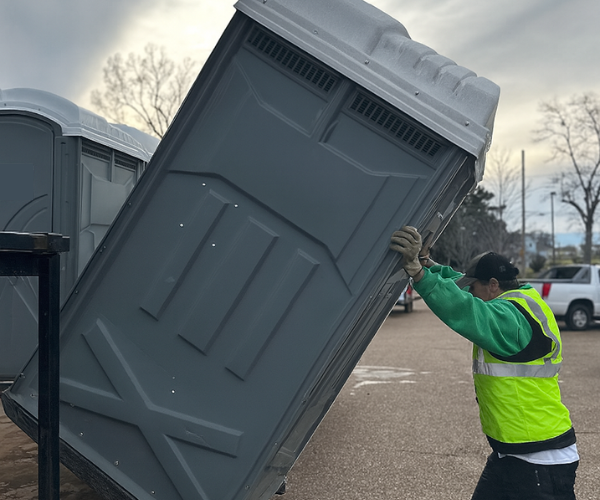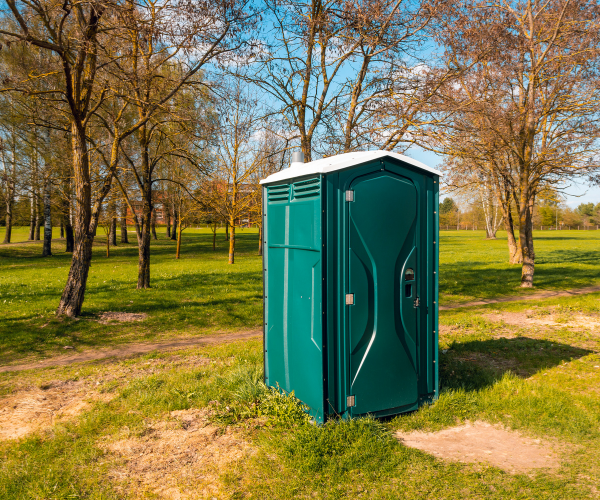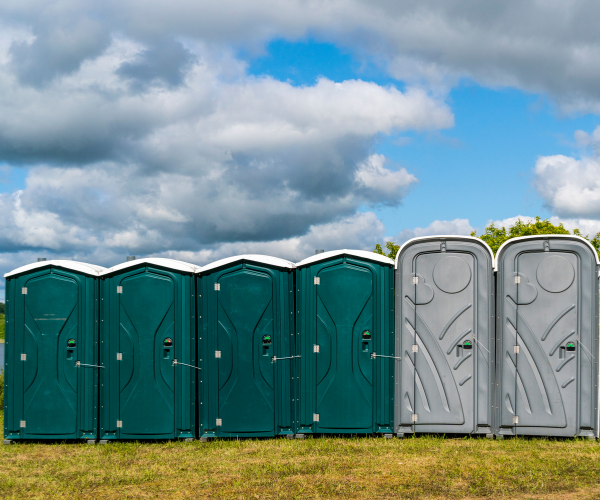Portable toilets offer numerous eco-friendly advantages, making them a sustainable choice for managing sanitation needs. These units are designed to conserve water – an essential resource – by using specialized waste storage methods that require minimal to no water. Traditional restrooms often use between 1.6 to 7 gallons of water per flush, whereas portable toilets utilize alternative waste containment systems that eliminate flushing water usage entirely. This makes them particularly beneficial in areas with limited access to water or during events where conserving resources is crucial. In addition to water conservation, portable toilets are designed to prevent contamination of the surrounding environment. They safely contain waste using tightly sealed tanks, significantly reducing the risk of leaks or spills that could harm local ecosystems. Furthermore, regular maintenance services ensure that waste is efficiently removed and processed at licensed treatment facilities, where it can be safely treated and disposed of. Adopting portable toilets for events or construction sites can substantially decrease the carbon footprint associated with building and maintaining permanent restrooms. These portable units are easily transported and set up, eliminating the need for extensive on-site facilities, which reduces energy consumption and material waste. Additionally, many portable restroom companies are now incorporating eco-friendly materials and waste treatment solutions into their designs, further enhancing their environmental benefits. Certain biodegradable solutions, such as eco-friendly chemicals and toilet paper, help in minimizing the environmental impact, allowing users to support sustainable practices without compromising on sanitation and hygiene. Altogether, portable toilets not only contribute to resource conservation but also align with eco-conscious initiatives by reducing water usage, maintaining safe waste management processes, and minimizing overall environmental impact. By choosing portable sanitation solutions, individuals and organizations can play a vital role in promoting sustainable practices and protecting our planet for future generations.

Portable Toilet Rentals in Soddy-Daisy, Tennessee
Call today for a free quote (423) 719-5081
Portable Toilet
Fast, Easy, & 100% Free To Get Started
Years of Experience
With over X years of experience, our company has fostered strong community ties in Soddy-Daisy, offering top-tier quality in portable toilets and unmatched commitment to customer satisfaction.
Quality Service Provided
We consistently provide top-notch service, prioritizing customer satisfaction and ensuring our portable toilets comply with the highest standards in Soddy-Daisy.
Fast and Reliable Delivery
Our fast delivery service ensures that portable toilets arrive promptly, enhancing convenience and reliability for every event or construction project in Soddy-Daisy.
Reliable Portable Toilet Solutions in Soddy-Daisy
Call for a Free Quote Today
(423) 719-5081
In Soddy-Daisy and surrounding Tennessee areas, we are your trusted provider for portable toilet rentals. Our company stands out due to our dependable service, locally owned expertise, and commitment to reliability. We cater to various events, including construction sites, parties, festivals, and weddings, ensuring clean and comfortable facilities for all your sanitation needs. We pride ourselves on offering top-notch service, guaranteeing customer satisfaction wherever our units are needed. As a local business, our in-depth understanding of the community enables us to serve our customers with exceptional reliability and trust.


Standard Portable ToiletOur standard porta john rental units are durable and reliable for any commercial build site, housing development, public works project, or remodel job.Features include dome lighting, grated floors, and an “In-Use” locking mechanism for privacy and comfort.Regularly maintained, inspected, and cleaned by FusionSite at your location.

Wheelchair Accessible RestroomsDeveloped as an alternative to full ADA-compliant restrooms, the Liberty is a spacious, wheelchair-accessible unit that can also be promoted as a family-sized restroom.Includes a patented flat-floor system for easy wheelchair access and maneuverability.Handrails, paper holder, and rotary latch are designed for simple, intuitive end-user operation.

Portable SinkPortable hand washing stations are essential for keeping your work site sanitary and clean.Features hands-free foot pumps, liquid soap, and paper towels.Perfect for job sites without water hookups, these units can handle hundreds of washes between services.
We Proudly Serve
Standard Portable Toilets
Our Standard Portable Toilets offer essential sanitation solutions in Tennessee, ensuring comfort and hygiene for all events.
High Rise Portable Toilets
High Rise Portable Toilets in Soddy-Daisy provide reliable upper-level sanitation for construction and events.
Restroom Trailers
The Bolles Co restroom trailers in Soddy-Daisy deliver luxurious portable sanitation for any event.
Roll off Dumpsters
The Bolles Co offers roll-off dumpsters in Soddy-Daisy for efficient waste management solutions.
Septic Tank Cleaning
Septic Tank Cleaning services in Tennessee by The Bolles Co ensure optimal sanitation system performance.
Grease Trap Cleaning
Grease Trap Cleaning services in Soddy-Daisy, Tennessee, maintain clear, efficient waste systems.
Fencing & Barricades
The Bolles Co offers Fencing & Barricades throughout Tennessee to secure event perimeters and ensure safety.
Residential Storage
Our Residential Storage solutions in Soddy-Daisy, Tennessee, offer secure, flexible storage options.
Soddy-Daisy Portable Toilets and More
Obtaining a quote and scheduling delivery for portable toilets has never been easier or more convenient. From the comfort of your home or office, simply access our website where you can fill out a straightforward form to receive an immediate quote. The form requires basic information such as your first name, last name, phone number, and email address, making the process quick and easy. Once you submit the form, our customer service team will promptly provide a competitive quote tailored to your specific needs. Should you have any questions or require additional information, our dedicated support team is ready to assist you via phone or email. Our streamlined ordering process ensures that you receive your portable toilets without any hassle, right when you need them. With our reliable delivery service, you can focus on your event or project while we take care of your sanitation needs, saving you time and ensuring peace of mind.

When it comes to choosing a portable toilet service, the local appeal is significant, which is why we strive to enhance the guest experience for any occasion in Soddy-Daisy. Nestled near the stunning Chickamauga Lake and the annual Tennessee Strawberry Festival, Soddy-Daisy is a hub for outdoor activities and community events, making our portable restrooms a perfect fit for occasions ranging from family gatherings to large festivals. Our units provide clean, reliable, and convenient sanitation solutions that effortlessly blend into the natural landscapes of the area, ensuring a pleasant experience for users. As a part of this vibrant community, we understand the importance of maintaining the local charm while delivering high-quality services. Choose our portable toilets to amplify the comfort and convenience of any event or construction project.
In Soddy-Daisy, we take pride in being the top choice for portable toilet services, thanks to our commitment to customer satisfaction and community engagement. As a locally owned business with vast experience, we cater to the specific needs of our clients, guaranteeing reliability and exceptional service. Our units are meticulously maintained, delivering clean and efficient sanitation solutions. Our diverse options perfectly fit any event's requirements, and our dedication is reflected in every aspect of our service, securing our reputation as the preferred choice in the area.
Fast, reliable service forms the backbone of our portable toilet business in Soddy-Daisy. With streamlined processes, we guarantee swift delivery for any event size or locale. Whether it's a small intimate gathering or a large public occasion, our dependable toiletry solutions meet your needs. We uphold exceptional reliability, ensuring portable toilets arrive on time. This commitment offers you peace of mind, allowing you to concentrate on the essential aspects of organizing a successful event.
Discover Soddy-Daisy Portable Toilets
Renting a portable toilet in Soddy-Daisy is a straightforward process thanks to our user-friendly website. To begin, simply navigate to our site where you'll find 'Get A Quote' buttons prominently displayed. Click any of these buttons to start the process. You'll be directed to a form that requires basic information: your first name, last name, phone number, and email address. This information ensures that our team can provide the most accurate and timely quote for your needs. We understand that convenience is crucial, which is why we've made sure the form is quick to fill out and submit. Upon completion, our team will receive your request immediately and will respond promptly with a detailed quote tailored to your specific requirements. This quote will include all relevant information regarding available units, services, and pricing. For any additional questions or assistance with your rental, you can reach out to our dedicated support team. They are always ready to help with friendly guidance and answers, ensuring your experience with us is smooth and hassle-free. You can contact them via phone or email, or by visiting our Soddy-Daisy location. Once you have reviewed your quote and are satisfied with the details, simply follow the instructions provided to complete your rental reservation. This process is designed to be efficient and customer-friendly, allowing you to focus on planning your event or project while we take care of your sanitation needs. Overall, our goal is to provide a straightforward and stress-free rental experience, ensuring that the portable toilets you need are delivered right when you need them, without the hassle or delay.
When it comes to delivering portable toilets, we understand that timing is everything, and our priority is to meet your needs promptly. Generally, the typical delivery timeframe for a portable toilet order can range from 24 to 48 hours, although this can vary depending on factors such as location, availability, and specific logistics requirements. Our team strives to accommodate last-minute requests whenever possible, understanding that event planning and construction projects can sometimes require urgent solutions. We work diligently to maintain a large inventory of rental units, ensuring we are prepared to meet demand at any given time. This allows us to offer flexible scheduling options, catering to both planned and spontaneous rental needs. Once you place your order, our operations team immediately begins coordinating logistics to determine the most effective route for delivery. This coordination includes arranging transportation, optimizing delivery schedules, and confirming site accessibility to ensure seamless service. For customers requiring consistent delivery services over an extended period, such as ongoing construction projects, we provide scheduled deliveries and pickups. This approach allows you to focus on your core activities without concerns about sanitation logistics. If your order is part of a larger event with specific timing needs, we encourage reaching out directly to our staff. Our representatives are experienced in accommodating the unique requirements of large-scale rentals, ensuring timely and efficient service that aligns perfectly with your event schedule. Overall, our commitment is to provide not only reliable sanitation solutions but also responsive customer service throughout the entire process, ensuring our portable toilets are delivered efficiently and meet your precise needs when you need them.
Yes, we are fully equipped to service any type of event or construction services, ensuring comprehensive sanitation solutions for every need. Our versatile range of portable sanitation units includes luxury restroom trailers, standard porta potties, roll-off dumpsters, secure fencing and barricades, holding tanks, ADA-compliant units, portable sinks, and hand sanitizer stations. Each of these options can be customized to fit the unique requirements of diverse events, from small family reunions to large corporate gatherings or music festivals. Our expertise extends to a vast array of events, including weddings, corporate events, community gatherings, and sporting events, adapting to both indoor and outdoor settings to provide the highest level of convenience and comfort for attendees. Our units are not only functional but also designed to blend in with any event decor or theme, offering an unobtrusive yet essential service. On the construction side, we understand the critical nature of providing reliable sanitation facilities for workers, which is why our services include durable, weather-resistant units tailored to withstand demanding worksite conditions. With options for delivery and maintenance on a schedule that suits your project timeline, we ensure compliance with health and safety regulations on site. Additionally, we prioritize accessibility and ease, with our attentive customer service team available to guide you in selecting the right solutions for your specific needs, providing insights and recommendations tailored to your event or construction project requirements. Ultimately, our goal is to ensure that all sanitation needs are seamlessly integrated into your planning, delivering clean and convenient facilities with minimal disruption. Thanks to our comprehensive range of services, you can trust us to support your event or project with professionalism and efficiency, maintaining high standards of cleanliness and reliability every step of the way.

